- Home
- Peter Ackroyd
Three Brothers Page 2
Three Brothers Read online
Page 2
In this, he was different from his brothers. Gradually the intimacy between them began to fade. Sam was left to himself. He spent many hours making elaborate contraptions out of wood and cardboard. Even though he did not know the word melancholy, he began to experience it. He would turn, head over heels, on his narrow bed in order to make himself dizzy and disoriented. He did not prosper at school. As a matter of course he was sent to the same secondary modern school as his older brother. He made no friends there, and Harry seemed to avoid him.
II
The path is clear
HARRY HANWAY left school at the age of sixteen, and was already eager to join the world. He was active, determined, and energetic. At school he had won popularity for his cheerfulness and bravado. He had become captain of the football team. He had retaliated against one notorious school bully by knocking him to the floor. He had his own recognisable phrases, which were instantly imitated. “How the heck are you?” was his standard greeting. He also said, in mock irritation, “What the heck?” So he became known as Harry Heck.
“I don’t want to go to college,” he told his father as his leaving day approached. “I want to get a job.”
“Say that again.”
“I want to get a job.”
“Just so you’re certain.” He looked away for a moment. “There’s nothing worse than a dead-end job.”
It was a Sunday afternoon. Philip Hanway was about to leave for the City. He now worked seven nights a week in order to support his family. “I’ll come back with money, Dad.”
“It’s not about the money. It’s about you.”
“But what do you think, Dad, of the newspapers? That’s a good life, isn’t it?” Harry loved newspapers. He enjoyed the appearance, and even the texture, of them. He liked their smell. He relished the size of the headlines and the neat rows of type. He was excited by the thought of thousands of copies despatched from the printing plant into waiting vans. In the evenings, after school, he flattened the Daily Sketch on the kitchen table and slowly turned its pages. Sometimes he read out paragraphs aloud, just like the news broadcasters on the wireless.
“Newspaper boy?” Daniel was writing in an exercise book, but now looked up at him.
“Dry up.”
“I was only asking.”
“Sod off.”
“There’s no need for a fight,” Philip said. “We have to think about this seriously.”
“I have thought about it seriously.”
So Harry arrived at the offices of the local newspaper, the Camden Bugle, and asked if they needed a messenger boy.
He was astonished to discover that the offices of the Bugle comprised two small rooms, one marked “Editorial” and the other marked “Advertising,” above a row of shops along the high street. Its premises were on the second floor above a barber, and the candy-striped pole could be seen from the desks of “Editorial.” The floor was covered with scuffed linoleum, and the interior needed repainting.
The Bugle, quite by chance, did need a messenger boy, the previous occupant of that post having just handed in his notice in order to become a gentleman’s outfitter in Bond Street. The editor, George Bradwell, prided himself on making his decisions in an instant. And he reckoned Harry to be a lively young man. “Do you run or do you walk fast?” he asked him. He had a gruff voice that seemed to come from his chest rather than his throat.
“I run, sir, when I see the path clear.”
“That’s good. That’s what you must do.” He had an emphatic manner of speaking, reminding Harry of the fairground barkers who came to Camden once a year. George Bradwell was not used to being interrupted or contradicted. He explained that Harry was supposed to take the “copy” from the office to the printer, and then bring the “proof” back to the Bugle. Copy of what? Proof of what? It was very mysterious. Bradwell then showed Harry some pages of typing, with various scrawls and symbols in the margins. “These,” he said, “have been marked up.” Harry nodded, as if he understood perfectly what he was being told. The air was heavy with the stale odour of tobacco. “Cadogan Street.” Pinned to the wall was a large map of the borough. Bradwell pointed with tobacco-stained finger to the street in question. “On the right is Lubin the printer. Just tell him you’re from the Bugle. This is Tony, by the way.”
Tony was a middle-aged man of florid complexion, with the indefinable air of having been disappointed in life. He boasted a thin pencil-like moustache, and a clump of hair perched precariously on his head. “You can’t miss Lubin,” he said. “He is the Jew boy.” Harry knew at once that Tony wore a wig, and he suspected that the moustache was dyed. Tony looked like a man perpetually in disguise.
Tony, in turn, took an instinctive dislike to the new recruit; any young person threatened him.
Harry soon became accustomed to his duties. He was so exhilarated by his new job that he mastered its details easily enough. He dashed from the Bugle to the printers. He ran between “Editorial” and “Advertising,” picking up the copy from both departments. In “Editorial” Tony was news. George was interviews and reviews. An elderly man, Aldous, was sports. Aldous hardly ever spoke, and seemed to Harry to exist in a state of self-pitying gloom. Stress and tension were always in the air. Bradwell would answer the telephone and announce himself as “editor in chief.” Tony would then give a sarcastic smile. Bradwell would often snatch his hat and coat, and stride purposefully out of the office. Sometimes he would not come back for an hour or more. Then he returned with an air of mystery, and with the odour of alcohol.
In the background there was always the stutter of a typewriter, as Tony or Aldous put together a paragraph. Aldous described the triumphs, or the miseries, of the Camden Rovers. He praised the exploits of a Camden schoolgirl who had won a North London javelin competition. He denounced the closing of the bar of the Camden Cricketers’ Association. He typed down all this with the same air of gloom. Tony celebrated a lucky win on the football pools by a Camden pensioner. He described the closure of a cottage hospital in East Camden. He reported the theft of a jukebox from a Camden public house. He sat over his typewriter like a bird of prey.
On the whole, Harry preferred “Advertising.” It was run by a small woman with a strong Scots accent. To Harry, Maureen seemed marvellously exotic. She wore a skein of artificial pearls over her hair and, according to Tony, dressed like something out of a shop window. He referred to her as Queen of Scots or Bloody Maureen. She supervised the work of two young men who were, again according to Tony, “slaves at her feet.” Maureen had overheard the remark; she had arched her eyebrows and sniffed. She considered Tony to be, as she put it, “a drastic little creature.” “Excuse me,” she said, “but I think he’s a very common type of person. And that wig looks like a dead cat.” Harry could not disagree.
Harry enjoyed his time in Lubin’s printworks. He savoured the pervasive smell of ink, and the steady metallic beat of the electrotyping machines. He saw the curved plates of metal type being inserted into the presses, and watched as the paper flowed between them. It was a cheerful and good-humoured place, filled with shouts and the noise of the machinery. This was the newspaper world that Harry had envisaged—a strident, exciting, declamatory world.
Harry was walking back from the printer one evening, after delivering the last of that day’s copy, when he noticed a man in a dark raincoat walking ahead of him. He was in his thirties, or so it seemed, but he was much smaller and slighter than Harry. He was carrying a shopping bag in each hand, containing something bulky or heavy. He had difficulty in maintaining an even pace, but he looked calmly from side to side. On a whim, or instinct, Harry decided to follow him. The man crossed the road, and then began walking down a street of semi-detached dark red-brick houses. The area was gloomy enough in the day, but on a winter evening it was a place in mourning. It was one of those parts of London that sunlight never seems to enter, an almost subterranean world of domestic privacy and seclusion. Net curtains were hanging at every window, and the gates of
the small front gardens were all closed.
Harry knew that the brick church of Our Lady of Sorrows stood at the end of this dark red avenue, opposite a small park. He suspected that the man was about to enter the park, but then he saw him vanish into the deep shadow of the church itself. He followed him through the porch, and then sat quietly in a pew at the back. The church was deserted. The man had walked slowly up the aisle and had halted at the wooden rail before the altar. It seemed to Harry that he had knelt down and, with his head bowed forward, begun to pray. But that was not what he was doing. Harry heard rustling, and noticed that he was taking something out of the bags. He walked towards him silently and cautiously; then, to his alarm, he saw two large cans of petrol. He did not hesitate. He shouted out “Heck!” and rushed at the man, knocking him to the floor before pinning him against the rail. The man looked at him, mildly, and did not try to resist.
The cry had roused the curate of the church, who had been dozing in the sacristy amidst the mild perfume of lilies and beeswax polish. He came running out, and was astonished at the spectacle of Harry straddling the man and pressing him against the floor of the church. Harry suggested to him that he might go in search of a policeman. A glance at the cans of petrol convinced the curate. “I’m in no possible hurry,” the man said as Harry continued to sit upon him. “Don’t you think this church is rather wonderful?” It was ornate and comfortable, with candles and flowers and images; statues of the saints stood between the Stations of the Cross, and a wooden confessional box was against the south aisle. “My mother used to frequent this place a great deal. She used to sit here with me. I was only a boy, naturally. That was in ’44. When the bombing got a trifle on the heavy side.” He had a plaintive or earnest expression, as if he were trying to solve a curiously subtle problem. “I can remember the bombs very well. I was never scared, you see. It was the excitement. Glorious feeling.” His voice, echoing in the empty church, was very gentle. “I was one of the Blitz boys. Have you heard of us by any chance?” Harry shook his head. The War was, for him, very distant. “We were the ones who put out the fires. We had buckets of sand and a hand-truck. We had iron bars to force our way in. We were absolutely fierce. We were ready to eat fires, even if I say so myself.”
The curate came back with three policemen. Harry rose to his feet and two officers took the man away. The third remained to take down Harry’s statement.
Harry told George Bradwell the following morning. He became so excited by his own narrative that he knelt on the floor to demonstrate the manner in which he had pinned down the arsonist.
“I think,” Bradwell said, “that we can make a story out of this.”
“But it’s true.”
“A news story. Bugle reporter foils arson attack upon church. Commended by the police for his heroism.”
“But I’m not a reporter.”
“You are now.” He glanced at the unoccupied desks of Aldous and of Tony. Harry sensed, then, that he did not altogether relish their company. “You know how to hold a pen, don’t you?” Harry nodded. “That’s a good start.”
Within a very short time Bradwell taught him how to construct a news story; he explained to him that he should begin with the simple fact, in a short sentence, and then gradually elaborate. He pointed out the places where Harry might acquire news—the magistrates’ court, the town hall, the police stations, the office of the coroner. He gave him lessons in typewriting, and even sent him on a course of shorthand. Bradwell seemed to be reliving the earliest stages of his own career; he saw in Harry a version of his younger self. He wished him to succeed. And Harry did. He had a natural gift for vivid description, and a keen eye for a likely story. Another messenger boy was hired.
Tony was furious at Harry’s appointment. He believed himself to have been supplanted and, in effect, humiliated. But he did not show his fury to those who had instigated it. He concealed it from Bradwell and Harry, but he vented it to Aldous. “He can’t write,” he said as they sat in a local public house. “He can’t spell. He is an ignorant little bleeder. I think he may be a pansy. What do you think?” Aldous was deeply uncomfortable about any such allusion. He merely shook his head. Tony’s anger emerged as genial malice in Harry’s presence. He was careful not to criticise him directly, but tried to unsettle him with jokes and insinuations. Harry feigned not to notice his resentment and bitterness.
He spent most of his time, in any case, out of “Editorial.” He rushed after stories of burglaries and assaults. He attended weddings and funerals. He waited outside the local police station for the arrival of the Black Maria van. He spent hours talking to the elderly clerk of the magistrates’ court, Mr. Peabody, who was a source of local information. Mr. Peabody was a grave and dignified gentleman, with a taste for whisky. He would speak eloquently of the foibles of a certain magistrate, or the surprising conclusion of a certain case; but as he drank he grew more thoughtful, until his conversation came to a lingering end. Harry knew that, at this stage, it was time to withdraw. He would leave Mr. Peabody at the bar, glass in hand, staring solemnly at the row of bottles above the cash register.
“Hanway? Hanway?” he asked Harry one evening.
“Yes, Mr. Peabody?”
“The name is known to me. I can recall it. It is an unusual name. Most unusual.” He reflected. “There was a young woman, by the name of Hanway, connected with the court in some way. Some years ago. I seem to remember her crying.”
Who was the young woman, crying? Could Mr. Peabody have some vague recollection of his mother? But, then, what had she to do with the magistrates’ court? Harry sensed, at that moment, that all this had something to do with her disappearance.
He decided to consult the court’s files. He knew the approximate date of his mother’s disappearance. It had been in the early winter. He recalled the smog. He had been ten years old. So he turned back to the records of October 1957. It was weary work, going through the reports of cases and incidents long forgotten. But he read on through evidences and judgements—until one name arrested his wandering attention. Mrs. Sally Hanway was brought before the court on 22 October 1957. He started to sweat, and looked away at a printed notice fixed to the wall. With an effort of concentration he turned back to the page, from which he had been momentarily distracted by a pang of anxiety so great that he caught his breath. At that instant, too, Daniel Hanway and Sam Hanway were seized with a sensation close to panic. Harry carried on reading and learned that Mrs. Sally Hanway had been found guilty of soliciting and of offending public morals. The magistrate had sentenced her to a term of three months’ imprisonment.
Harry got up from his chair and walked down the long corridor of the building. He came out of the entrance, descended the stone steps, and was then sick on the pavement. He steadied himself against a pillar, and breathed in deeply. He had a sudden image of her, standing on the steps of the magistrates’ court, with her finger to her lips. He went back to the library, and replaced the heavy volume on the shelves.
It was only when he had walked out again into the street that he realised something else. His father had known of this. That is why he had evinced no surprise. That is why he had never spoken of her disappearance. And the neighbours must also have known of his mother’s arrest. Out of pity or embarrassment, they had not remarked upon her absence to the three young brothers. He realised, too, that with this knowledge he could no longer remain in the house with his brothers.
The life of the Hanway household was not, in any case, as it once had been. The brothers had steadily grown apart. Daniel spent his evenings in study, while Harry pursued his new work. Without the company of his older brothers, Sam had become aimless. He had no friends and spent his time, outside of school, roaming through the streets—in search of what? Their father had changed his job. He gave up his post as nightwatchman, and had become a long-distance lorry driver with a regular run from London to Carlisle; as a result he spent less time than ever at home.
Harry took advantage of his f
ather’s absence to leave quietly and quickly. He found a small room in a street close to the offices of the Bugle. He had few possessions; what he owned could be carried in a suitcase.
Daniel saw him packing. He asked him where he was going.
“Now that’s an excellent question. I’m going away. I’m taking off.”
“For good?”
“Nothing is for good, clever boy.”
“Dad won’t like it.”
“Dad will like it. You will have more space. Sam can have my room.” He closed the lid of the suitcase. “Dad doesn’t even know I’m here. When is he ever at home?”
“Where are you going then?”
“Carver Street.”
It was a street of small houses and of small shops. They were some of the first buildings ever erected in the fields of Camden, in the early nineteenth century, but they did not wear their age gracefully. Their yellow brick had faded with grime and decay; the doors were peeling, and the windows were dusty. A sudden gap in the row of houses marked the spot where a stray doodlebug had flattened two houses; they had not yet been rebuilt, and the open site was covered in weeds and refuse. The windows of Harry’s room overlooked this waste-ground. He rented the room from an elderly Irish couple, the Stantons, whose son had recently died of poliomyelitis. It was the son’s room that Harry now occupied. A crucifix hung on the wall above the bed.
Harry had never been alone before. He had never thought of himself as solitary. He had lost contact with his erstwhile school friends, but he would have denied ever being lonely. He never once used the word. But now he sat by himself in any number of cheap cafés, where the principal resource was egg and chips and brown sauce. It was the sauce, in fact, that effected his introduction to Hilda. She was sitting at the table next to his in the Zodiac Café for Working Men. He was shaking the bottle of sauce so vigorously that it splattered over her plate of spotted dick and custard.

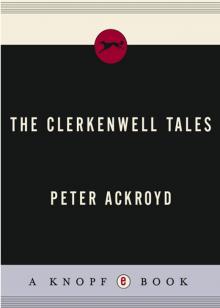 The Clerkenwell Tales
The Clerkenwell Tales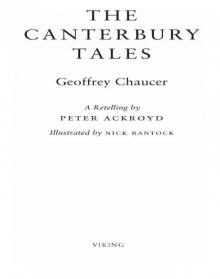 The Canterbury Tales
The Canterbury Tales J. M. W. Turner
J. M. W. Turner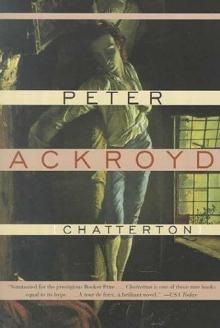 Chatterton
Chatterton The Canterbury Tales – A Retelling
The Canterbury Tales – A Retelling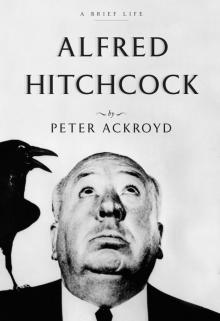 Alfred Hitchcock
Alfred Hitchcock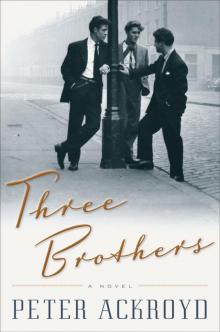 Three Brothers
Three Brothers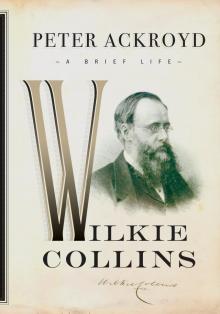 Wilkie Collins
Wilkie Collins Venice
Venice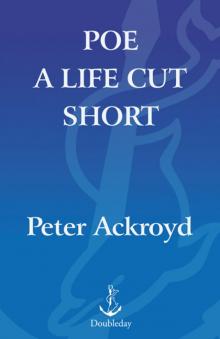 Poe
Poe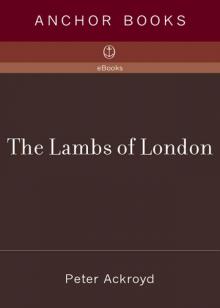 The Lambs of London
The Lambs of London London
London Queer City
Queer City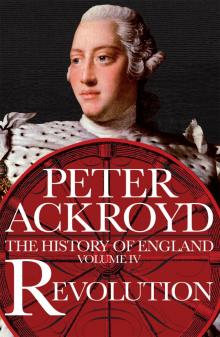 Revolution, a History of England, Volume 4
Revolution, a History of England, Volume 4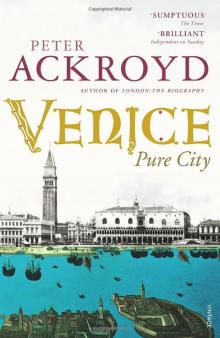 Venice: Pure City
Venice: Pure City Foundation
Foundation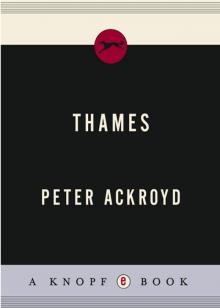 Thames
Thames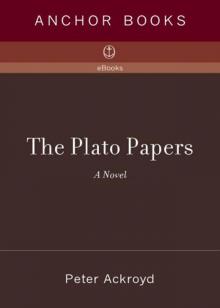 The Plato Papers
The Plato Papers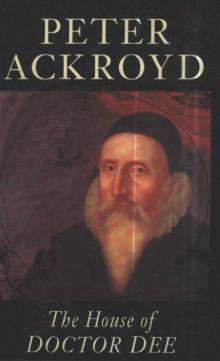 The house of Doctor Dee
The house of Doctor Dee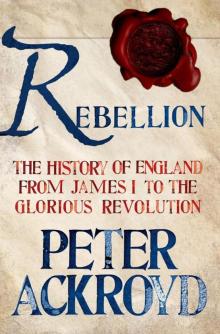 Rebellion: The History of England from James I to the Glorious Revolution
Rebellion: The History of England from James I to the Glorious Revolution Albion: The Origins of the English Imagination
Albion: The Origins of the English Imagination The Fall of Troy
The Fall of Troy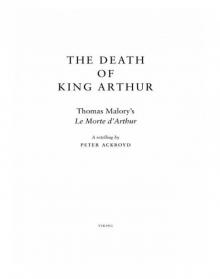 The Death of King Arthur
The Death of King Arthur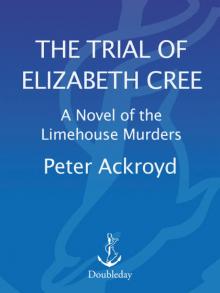 The Trial of Elizabeth Cree
The Trial of Elizabeth Cree London: The Biography
London: The Biography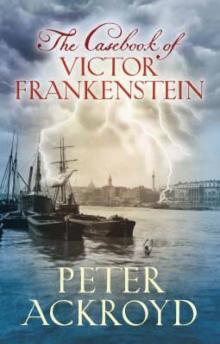 The Casebook of Victor Frankenstein
The Casebook of Victor Frankenstein Hawksmoor
Hawksmoor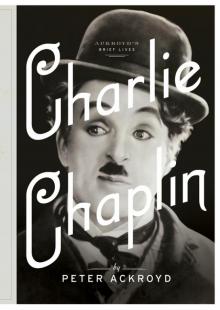 Charlie Chaplin
Charlie Chaplin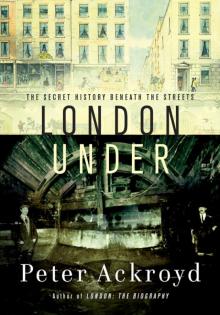 London Under
London Under